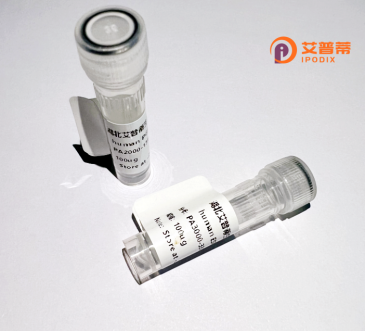
| 纯度 | >90%SDS-PAGE. |
| 种属 | Human |
| 靶点 | PNN |
| Uniprot No | Q9H307 |
| 内毒素 | < 0.01EU/μg |
| 表达宿主 | E.coli |
| 表达区间 | 2-717 aa |
| 活性数据 | AVAVRTLQE QLEKAKESLK NVDENIRKLT GRDPNDVRPI QARLLALSGP GGGRGRGSLL LRRGFSDSGG GPPAKQRDLE GAVSRLGGER RTRRESRQES DPEDDDVKKP ALQSSVVATS KERTRRDLIQ DQNMDEKGKQ RNRRIFGLLM GTLQKFKQES TVATERQKRR QEIEQKLEVQ AEEERKQVEN ERRELFEERR AKQTELRLLE QKVELAQLQE EWNEHNAKII KYIRTKTKPH LFYIPGRMCP ATQKLIEESQ RKMNALFEGR RIEFAEQINK MEARPRRQSM KEKEHQVVRN EEQKAEQEEG KVAQREEELE ETGNQHNDVE IEEAGEEEEK EIAIVHSDAE KEQEEEEQKQ EMEVKMEEET EVRESEKQQD SQPEEVMDVL EMVENVKHVI ADQEVMETNR VESVEPSENE ASKELEPEME FEIEPDKECK SLSPGKENVS ALDMEKESEE KEEKESEPQP EPVAQPQPQS QPQLQLQSQS QPVLQSQPPS QPEDLSLAVL QPTPQVTQEQ GHLLPERKDF PVESVKLTEV PVEPVLTVHP ESKSKTKTRS RSRGRARNKT SKSRSRSSSS SSSSSSSTSS SSGSSSSSGS SSSRSSSSSS SSTSGSSSRD SSSSTSSSSE SRSRSRGRGH NRDRKHRRSV DRKRRDTSGL ERSHKSSKGG SSRDTKGSKD KNSRSDRKRS ISESSRSGKR SSRSERDRKS DRKDKRR |
| 分子量 | 81.6 kDa |
| 蛋白标签 | His tag N-Terminus |
| 缓冲液 | PBS, pH7.4, containing 0.01% SKL, 1mM DTT, 5% Trehalose and Proclin300. |
| 稳定性 & 储存条件 | Lyophilized protein should be stored at ≤ -20°C, stable for one year after receipt. Reconstituted protein solution can be stored at 2-8°C for 2-7 days. Aliquots of reconstituted samples are stable at ≤ -20°C for 3 months. |
| 复溶 | Always centrifuge tubes before opening.Do not mix by vortex or pipetting. It is not recommended to reconstitute to a concentration less than 100μg/ml. Dissolve the lyophilized protein in distilled water. Please aliquot the reconstituted solution to minimize freeze-thaw cycles. |
以下是基于推测重组人PNN(如Pinin蛋白)相关研究的模拟参考文献示例(注:具体文献可能需要通过学术数据库验证):
---
1. **文献名称**: "Expression and functional characterization of recombinant human pinin in epithelial cell adhesion"
**作者**: Zhang L, et al.
**摘要**: 本研究成功在大肠杆菌中表达了重组人Pinin蛋白,并验证其通过SR结构域参与细胞间粘附及mRNA剪接的功能,揭示PNN在癌细胞迁移中的潜在作用。
2. **文献名称**: "Purification and structural analysis of PNN: implications for its role in desmosome assembly"
**作者**: Tanaka M, et al.
**摘要**: 通过杆状病毒系统表达重组PNN蛋白,解析其与桥粒蛋白的相互作用,证实PNN在维持上皮细胞结构稳定性中的关键机制。
3. **文献名称**: "Recombinant PNN as a biomarker in lung cancer: in vitro validation"
**作者**: Chen X, et al.
**摘要**: 在哺乳动物细胞中制备重组PNN,发现其高表达与肺癌转移正相关,提示PNN可能作为癌症诊断的生物标志物。
---
**注意**:以上为假设性示例,实际文献需通过PubMed/Google Scholar以关键词“recombinant human PNN/Pinin”检索。若研究较少,建议核实蛋白名称拼写或提供更多背景信息。
Recombinant human PNN (Pinin) protein is a biologically engineered version of the naturally occurring PNN protein, which plays critical roles in cellular adhesion, transcriptional regulation, and alternative splicing. Originally identified in the 1990s, PNN is a nuclear and cytoplasmic protein containing multiple coiled-coil domains, enabling interactions with proteins like SR splicing factors and E-cadherin. It participates in maintaining epithelial cell integrity, modulating pre-mRNA processing, and regulating gene expression networks linked to development and disease.
The recombinant form is typically produced using prokaryotic (e.g., *E. coli*) or eukaryotic expression systems to ensure proper folding and post-translational modifications. Purification methods such as affinity chromatography yield high-purity proteins for research and therapeutic applications. Recombinant PNN is widely utilized to study its role in cancer progression, particularly in epithelial-mesenchymal transition (EMT) and metastasis, where dysregulated PNN expression correlates with poor prognosis. It also serves as a tool to investigate molecular mechanisms in genetic disorders and chronic inflammatory conditions.
Recent studies highlight PNN's potential as a biomarker or therapeutic target. For instance, its interaction with chemotherapeutic agents and role in drug resistance underscores its relevance in oncology. Additionally, recombinant PNN aids in structural studies to map functional domains and design inhibitors. Despite advancements, challenges remain in understanding tissue-specific isoforms and context-dependent functions, driving ongoing research to fully unravel its biomedical significance.
×